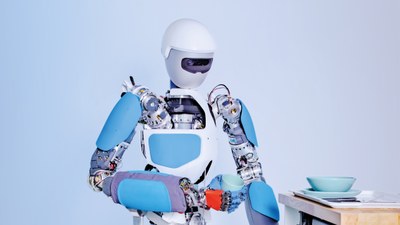Terrestrial Assistance

Doing the laundry and cooking, emptying the dishwasher or tidying up the home, providing support in the workplace - whether in the private, commercial, care or medical environment, robotics should make life easier in all situations in the future. To fulfil this vision, we at the institute are developing intelligent assistance systems that can support people in everyday activities and professional services.
Another important area of application in which breakthroughs in the use of assistance robots can be expected in the near future is healthcare. Here, assistance robots should help to maintain the highest possible quality of life, carry out medical treatments and relieve the workload of specialists.
Currently, robots with manipulation capabilities are not yet to be found in public spaces. The capabilities of current research robots are therefore being further improved at DLR in order to be able to evaluate the first systems in the field or in realistic environments. Modern lightweight robotics, which has been significantly shaped at DLR, forms the basis for the development of robotic assistance systems for terrestrial applications.
In order for robots to operate autonomously in public spaces, they must be able to detect and monitor the state of the environment, navigate and move safely in unstructured environments, perform manipulation activities robustly and reliably and continuously adapt their behaviour to the current situation. Intuitive multimodal interfaces are required to control the systems. In addition, the robots must detect errors in the execution of tasks and react accordingly. Significant progress has been made in all these areas in recent years. In conjunction with the globally unique DLR robot systems, pioneering application examples for terrestrial assistance robots have been demonstrated. Through future developments, we want to make it possible for assistance robots with manipulation capabilities to be used in real everyday applications in the future.
Currently the research activities of the Institute of Robotics and Mechatronics in the terrestrial assistance field focus on the following topics:



